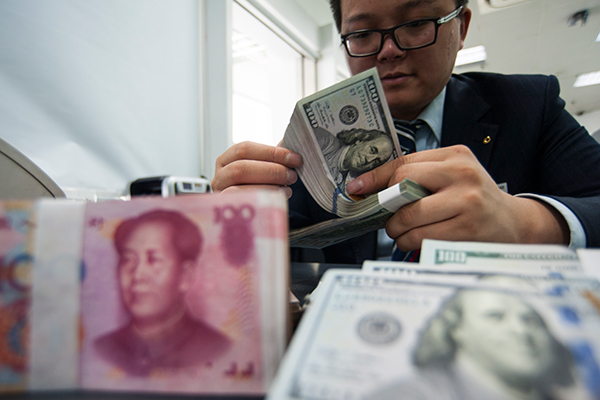Really 'no need to panic' over forex reserve drop?
- By Ma Guangyuan
 0 Comment(s)
0 Comment(s) Print
Print E-mail China.org.cn, February 13, 2017
E-mail China.org.cn, February 13, 2017
|
|
|
An employee at a bank counter in Nantong, Jiangsu province, counts renminbi and dollars. [Photo/China Daily] |
The People's Bank of China (PBC) announced on Feb. 7 that the country's forex reserves stood at US$2.998 trillion in January, down by US$12.3 billion from US$3.011 trillion in December.
Given the continued reduction of forex reserves in January, the whole stockpile fell below US$3 trillion, which was within the public's anticipation, as the yuan continues to feel pressure from depreciation and capital outflow.
As per official explanations, the PBC supplied the market with forex capital to adjust the balance between demand and supply, which led to the forex reserve drop. The PBC said that during the traditional Chinese New Year, outbound travel and consumption boomed, and financial transactions, such as debt payments and settlements, increased, among other seasonal factors that caused the situation.
The central bank added that the forex reserve contraction in January was "noticeably" smaller both on the year-on-year basis or compared with that in the month earlier, even when currency revaluation factors are taken into account. It assured that cross-border capital flows would be more balanced in the future when the Chinese economy gains more momentum for growth.
The central bank reiterated: "Although the stockpile fell slightly short of US$3 trillion, it is still the largest in the world," adding that "a fluctuating reserve scale is normal, and there is no need to fear the so-called 'integer threshold' since the country's forex reserve scale is abundant judged by any standard."
In response to the official account, institutes and scholars rushed to echo in sync, expressing ideas such as "no need to panic when forex reserve falls short of US$3 trillion."
A basic piece of knowledge, however, is that one has to see both the gross scale and the changing trend to rule whether or not a country's forex reserve is sufficient. Focusing on China's large forex reserve size, now still the world's highest, is apparently not convincing enough, because capital is flowing out of China from various channels, as a result of the yuan's continuous depreciation expectation.
Though China's forex reserve is still near US$3 trillion, we have to understand how much of it could be at our disposal. Having US$3 trillion on paper does not mean having US$3 trillion to spend; it is a common sense.
While we have ample reasons to defend the forex reserve reduction, we must be sober enough to see that the trend of continuous reduction, if left uncontrolled, will quickly drain off however much we have in the stockpile. From June 2014 to January 2017, in two and half years, China's forex reserve shrank by almost 30 percent.
The reason why conclusions such as "no need to panic" surfaced was perhaps that the U.S. dollar is appreciating at a slower pace. But however much U.S. President Donald Trump messes around, the U.S. economy will continue to develop while the dollar appreciates.
This year will see increasing uncertainty in the global economy. Similarly, China has yet to find solutions for risks in the wake of last year's "property-sustained prosperity." The current complication of the world economy is beyond the notion that capital has ceased to flow out from China.
While the public still holds reservations about the outcome of China's economy and reform, I think that the trend of "selling renminbi assets" will not change in the short term and that China still faces the pressure of outflowing capital. I insist that China's ability to control capital outflow is key to ensuring the goal of stability in 2017.
I used to stress that China should learn historical lessons on capital outflows and solve the issue with wiser methods, rather than simply limiting such outflows. The yuan's depreciation is not worth fearing compared with capital outflows because they will fundamentally weaken confidence in the Chinese economy. In China there are too many ways in which capital can flow out of the country; our limited regulation can hardly supervise everything.
What China really needs to do is to give some strategic attention to capital outflow, a huge risk, and take decisive measures to overturn the public's pessimism.
I have also stressed that capital outflow reflects confidence in the Chinese economy more than the value of the yuan itself. The key to stabilizing confidence lies in advancing reform and in respecting the consensus built on reform achievements during the past 40 years.
As long as reform does not go wrong, a massive outflow of capital will not take place, given the Chinese economy still has room for development. In other words, as long as there is a positive expectation for the economy, a further contraction of forex reserves is not worth worrying about.
The writer is an independent economist.
The article was translated by Chen Boyuan. Its original unabridged version was published in Chinese.
Opinion articles reflect the views of their authors, not necessarily those of China.org.cn.







Go to Forum >>0 Comment(s)